Buddhism In Asia
-
Catholic leaders send greetings for Buddha's birth
UCANews, April 28, 2006
SEOUL, South Korea -- Cardinal Nicholas Cheong Jin-suk of Seoul has issued a message greeting all Buddhists in South Korea on the occasion of Vesak. Cardinal Cheong said in his April 26 message, "I congratulate all Buddhists on the occasion of Buddha's birthday this spring, when all creation comes into new being." This year Korean Buddhists will celebrate Vesak, the holiday commemorating Gautama Buddha's birth, on May 5.
The cardinal observed that although Buddha bestowed universal compassion and goodwill on people, to this day conflict, hate, hostility and many kinds of discrimination are prevalent in the world. "That is why we need Buddha's teaching more and more. We believe that we can solve the problems by following Buddha's compassion and practicing love, which is the fundamental teaching of all religions," he said.
Mentioning that Pope Benedict XVI has stressed interreligious dialogue and harmony in this pluralistic age, Cardinal Cheong expressed his intention to help build a peaceful society through more active interfaith dialogue that results in all people contributing to promote the common good.
On April 25, the Catholic Bishops' Conference of Korea (CBCK) sent its Korean translation of the Vatican's annual Vesak message to the Jogye Order, the nation's largest Buddhist denomination, and to Church-run and secular media.
The message, "Buddhists and Christians at the Service of Humanity," was signed by Archbishop Michael L. Fitzgerald as president of the Pontifical Council for Interreligious Dialogue before Pope Benedict reassigned him in February as apostolic nuncio to Egypt and to the Arab League.
The Jogye Order posted the translated Vatican message on its Web site (http://www.buddhism.or.kr), along with Cardinal Cheong's message.
Meanwhile, Venerable Beopjeon, patriarch of the Jogye Order, issued a Vesak message on April 25. In it he wrote: "Those who open the sharp eye of discernment in anguish will see the Buddha. Those who are awakened to redemption in love will see Jesus."
The Buddhist leader urged the people to see the living Buddha in all people they meet daily. He said that Samantabhadra Bodhisattva (pervading goodness of highly enlightened beings) and Maitreya (the merciful Buddha) are everywhere.
"Though one may search everywhere and never find the place in this world where it exists, within the truth of 'everything is Buddha' the essence of reality is revealed and the infinite light is laid out before us all," the Jogye leader explained.
An official of the order told UCA News on April 27 that Buddhists would hold a Vesak ceremony in the Jogye Temple in downtown Seoul on May 5, at which time Venerable Beopjeon's message and congratulatory messages from other religions would be presented in public. -


.jpg)
(1).jpg)
(1)(1).jpg)
(1)(1)(1).jpg)
-
(1)(1)(1)(1).jpg)
(1)(1)(1)(1)(1).jpg)
(1)(1)(1)(1)(1)(1).jpg)
(1)(1)(1)(1)(1)(1)(1).jpg)
(1)(1)(1)(1)(1)(1)(1)(1)(1)(1)(1).jpg)
-
(1)(1)(1)(1)(1)(1)(1)(1)(1)(1)(1)(1)(1)(1)(1)(1)(1)(1).jpg)
(1)(1)(1)(1)(1)(1)(1)(1)(1)(1)(1)(1)(1)(1)(1)(1)(1)(1)(1)(1).jpg)
(1)(1)(1)(1)(1)(1)(1)(1)(1)(1)(1)(1)(1)(1)(1)(1)(1)(1)(1)(1)(1)(1).jpg)
-
Fostering peace through Buddhist cinema
The Star, May 2, 2006
Fifteen organisations from all Buddhist traditions have joined hands to make the inaugural Wesak International Film Festival (WIFF) a success.
Kuala Lumpur, Malaysia -- Wesak Day celebrates the birth, enlightenment and passing of Lord Buddha. It is also a day to remember his teachings of understanding, respect and tolerance.


http://www.wiff.org.my/ -
AWESOME!
-



Vesak (Hanamatsuri) celebrations held in Kyoto City, Japan on 8 April 2006.
(Pictures from Nishi Hongwanji website http://www.hongwanji.org.jp) -
I strongly believed that Buddhism will grow in Asia and continue to florish in the west - as it is already happenning.
But I do hope and wish that it will be a healthy growth with peace and harmony. Not only with other faiths, but also with different lawful schools of Buddhism.
Many, including myself, have discover the beauty of Buddhism. In Chinese "Bo2 Da4 Jing1 Shen1" - really amazing and spectacular.
But this is not without challenges, mistakes and self-examinations. It really took me a couple a years to discover the great wisdom of this tradition.
Amitabha. -
Buddha Day festival
The Nation, April 29, 2006
The Visakha Buja Day Festival will be celebrated around the world between May 6 and May 22.
Bangkok, Thailand -- The United Nations has recognised Visakha Buja Day as one of the world's most important days. It is sometimes referred to as "Buddha Day", because three important events in the Lord Buddha's life occurred on this day - his birth, his enlightenment and his death.
Buddhism Promotion Centre of Thailand secretary-general Phra Thep Dilok yesterday said the events marking the festival would take place in Sanam Luang, the UN office in Bangkok, Buddha Monthon in Nakhon Pathom and selected locations in every province.
HRH Princess Maha Chakri Sirindhorn will grant awards to 170 people on May 8 in recognition of their contribution to Buddhism. The awards would come in the form of a gold Sema pillar, he said. A sema is a stone used to mark a temple's precinct -
Lotus lantern fest to mark BuddhaÂ’s birthday

The large street event in downtown Seoul on Sunday was part of the Lotus Lantern Festival to celebrate BuddhaÂ’s Birthday, which is on May 5 this year according to the lunar calendar.
The main event of the birthday celebrations, called the “Buddhist Street Festival,” began at noon and went until 7 p.m. in the streets around Jogyesa Temple and Jonggak subway station.
More than 100 booths and stages displaying traditional Korean and Buddhist art were set up in the area and visitors were able to look at a variety of art and craft exhibits, play games and watch musical and dance performances.
This year, visitors saw 20 monks carve wooden sutras (patterns), which reminded them of their great achievement of carving 80,000 Tripitaka during the Goryeo Kingdom.
Buddhists from Indonesia, Nepal, China, Sri Lanka, lndia and Mongolia were there to explain to people in Korea what Buddhism is like in their countries. During an event called “Lotus Lantern Making Festival for Foreigners,” 200 foreigners learned how to make lanterns in front of Jogyesa Temple.
Around 7 p.m., the organizing committee gave people small lanterns to carry at Tapgol Park and the people marched in a big parade from Dongdaemun Stadium to Jogyesa Temple. Visitors also enjoyed a Lotus Lantern music concert that started at 9:30 p.m. and at the end of the festival, everyone danced together hand in hand.
Because BuddhaÂ’s birthday is on the same day as ChildrenÂ’s Day this year, many fun programs for children and their families combining the two holidays are being offered, such as an exhibition of bright and colorful lanterns at Pongunsa Temple in southern Seoul. -
http://english.kbs.co.kr/vod/asx.php?url=vnews$2006$05$01$060501_6.wmv&title=&starttime=&endtime=
Remember to turn on the speakers!





-
nice pics leh...u went korea har?
-
Thailand hosts World Buddhism conference
Bangkok Post, May 8, 2006
Nakhon Pathom, Thailand -- Thailand is hosting an international Buddhism conference, marking the World Visakha Puja Day and the auspicious occasion of the 60th anniversary of His Majesty King Bhumibol Adulyadej's ascension to the throne this year.
The World Visakha Puja Conference, hosted by Thailand for the third consecutive year, is organized at Buddha Monthon in the country's central province of Nakhon Pathom from May 7-10.
More than 1,500 Buddhist leaders from 45 countries across the world are participating in the four-day conference, chaired by Somdej Phra Puthajarn, a senior Thai monk, on behalf of the country's Supreme Patriarch.
The United Nations has designated Visakha Puja Day, a holiest day of all Buddhists marking the birth, enlightenment and nirvana of the Lord Buddha, as a world significant day--the World Peace Day--and Thailand as the World Buddism Centre.
The world Buddhist leaders are discussing approaches to publicize Buddhism worldwide and to effectively apply the Buddha's teachings to world peace, focusing on three principles, including happiness, peace and warmness.
An exhibition on World Visakha Puja Day--the World Peace Day--was also organized at the four-day forum.
Most Ven.Tibatuwawe Sri Sumangala Maha Nayaka Thero, a Sri Lankan Buddhist leader, told the conference on Sunday that the world todays needs the Buddha's teachings to promote peace and solve such international problems as terrorism, rising population, drug and human trafficking and gender discrimination.
Most Ven. Ajarn Brahmavamso, an Australian Buddhist leader representing western Sangkha, said that the Buddhism is a religion of peace applicable to the modern world.
He urged the world Buddhists to conserve the traditional Bali language and to publicize the Buddha's teachings worldwide through the Internet.
Somdej Phra Puthajarn said that the world Buddhist leaders would join a mass prayer, also attended by more than 20,000 Thai Buddhists, at the Temple of the Emerald Buddha here on May 9 to pay tribute to His Majesty the King on the auspicious occasion of the beloved monarch's 60 years on the throne this year--also as the world's longest reigning monarch.
The religious rite will be live broadcast on the government-run TV Channel 11.
Thai Buddhists normally make merits and attend sermons at temples on Visakha Puja Day, falling on May 12 this year. In the evening, Buddhist monks lead the laity in a magnificent candle-light triple circumambulation of Buddhist chapelss throughout the country. -
Lam Dong province presents gifts to Buddhist monks and nuns
VNA, May 8, 2006
Lam Dong, Vietnam -- The authorities and mass organisations in Central Highlands Lam Dong province from May 7-8 sent many delegations to visit and present gifts to monks and nuns at Buddhist pagodas in the province on the occasion of Buddha's 2630th birth anniversary and the 2550-year Buddhist calendar.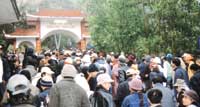
-
Hong Kong celebrates Buddha's Birthday
Xinhua, May 5, 2006
HONG KONG, China -- More than 5,500 monks, nuns, Buddhists disciples and officials gathered here Friday morning in front of the landmark building of the Conference and Exposition Center to celebrate the Buddha's Birthday, which falls on May 5 this year.
A grand Buddhist service and ceremony was held to commemorate the birth of Sakyamuni, the founder of Buddhism, as monks and nuns crossed their palms and chanted Buddhist scripture.
"The grand celebration of the Lord Buddha's Birthday is a vivideye witness of social stability and unity in Hong Kong," Rev Kok-kwong, President of Hong Kong Federation of Buddhists said after officiating the ceremony.
"We Buddhists in Hong Kong should contribute our parts to strengthen cooperation with other Buddhists and bring peace to the society," the Buddhist master said.
Hong Kong has currently about 800,000 Buddhist disciples, making Buddhist the religion that has the largest followers in the city. A series of Buddhist service and ceremony will be held every year to celebrate the Buddha's Birthday, which was declared a public holiday in Hong Kong since 1997. -
Asian nations join forces to repair mural
UPI, May 8, 2006
NARA, Japan -- Japan, South Korea and Taiwan plan to jointly restore a 270-year-old Buddhist mural at one of South Korea's three major temples, starting in June.
It will be the first time the Asian neighbors have worked together on a full-scale cultural heritage repair, the Japanese newspaper Yomiuri Shimbun reported Monday.
The 25 members of the combined team, led by Akira Yamauchi of Japan's Gangoji Institute for Research of Cultural Property, will repair the mural at Tongdo Temple in the city of Yangsan in South Gyeongsang province.
The 13-by-7.5 feet mural -- the only work of its type in South Korea -- depicts the world of the Lotus Sutra, complete with images of the Buddha, bodhisattvas and a pagoda.
Yamauchi, who is in charge of cultural heritage restoration at the Gangoji Institute, proposed the restoration of the mural two years ago after he discovered the color was damaged and the 4-inch-thick clay on which it was painted was cracking and flaking.
The team will reinforce the clay to prevent parts of the mural from breaking off. The specialists also will examine the pigments and design of the picture, among other restoration-related work. -
Rejoice.
 Amitabha
Amitabha -
Malaysia: Thousands celebrate Wesak
by Rizalman Hammim, Nurris Ishak and Minderjeet Kaur, New Straits Times, May 13, 2006
KUALA LUMPUR, Malaysia -- Thousands of devotees thronged Buddhist temples nationwide yesterday to celebrate Wesak. Temples were lit with hundreds of candles, and the sound of bells could be heard miles away.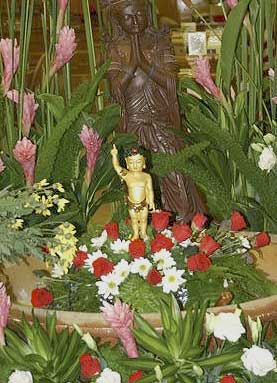
Bathing the Baby Buddha is a popular ritual during Wesak
The smell of burning joss sticks also permeated the air as devotees knelt to pray and seek blessings. There was also a carnival-like atmosphere outside the temples, with many stalls selling flowers, religious trinkets and food.
The celebration commemorated the birth, enlightenment and death of Siddharta Gautama Buddha.
At the Kwan Inn Teng temple in Petaling Jaya, Housing and Local Government Minister Datuk Seri Ong Ka Ting reminded Malaysians to be thankful that they live in a harmonious multiracial and multi-religious society. "We are very lucky to be living in a country which provides for the freedom of religion in its constitution," he said.
He also said Malaysians must help and accept each other regardless of race or religion to achieve Vision 2020.
In conjunction with the celebration, the temple also presented scholarships, study loans and donations, worth RM350,000, to deserving students and charitable bodies.
At the Taman Jaya Buddhist Temple in Petaling Jaya, the scene was similar with many devotees offering prayers and queuing to be blessed with holy water.
At the Buddha Maha Vihara temple in Brickfields, the celebration started at dawn with devotees observing the "Atta Sila" (Eight Precepts).
This was followed by the hoisting of the Buddhist Flag by the Sri Lankan High Commissioner, C.D. Casie Chetty.
The theme for this year’s celebration was ‘Respect Human Rights, Promote Mutual Understanding’.
According to Sasana Abhiwurdhi Wardhana Society president Sarath Wickrama Surendre, they decided on this theme as, in the light of events over the past one year, "we realised that many Malaysians do not understand their basic human rights".
"The theme is also apt because Buddha taught that mankind should respect human rights," he added.
The temple also held a blood and organ donation drive, and its Buddhist Institute Sunday Dhamma Schools organised a colouring competition for children as well as staging a dance and drama performance by its students.
Meanwhile, at the Mahindarama Buddhist Temple in Jalan Kampar, Penang, the chief monk Venerable E. Indaratana Maha Thera led a special prayer ceremony for world peace, happiness and harmony.
He also said the Malaysian Buddhist Association was building 50 houses for tsunami victims in a village in Sri Lanka and donations would be channelled to Sri LankaÂ’s Amata Foundation.
During the prayers, a 10-metre-tall Buddha, which devotees took two weeks to complete, was unveiled and 2,550 bulbs were lit at the temple to signify the 2,550th Wesak anniversary.
A devotee, Sapna Malhotra from Puna, India, was excited at being able to celebrate the holy day in Penang for the first time.
The 18-year-old student said it was nice to see Buddhists of different races gather at the temple to offer prayers to Buddha. -
Documentary on MalaysiaÂ’s Chief Monk to premier at Wesak International Film Festival (WIFF)
The Buddhist Channel, May 14, 2006
Kuala Lumpur, -- For more than half a century, K Sri Dhammananda has been a leading light in disseminating Buddhism in Malaysia. Although there are different schools of Buddhism practiced in this country, such is his deep impact on the community that he is affectionately known by all as Chief Venerable, or just "Chief".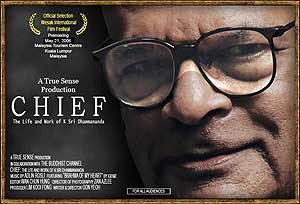
To commemorate his remarkable achievement, a documentary on the VenerableÂ’s life has been produced by new media house True Sense. The film will be premiered at the forthcoming Wesak International Film Festival (WIFF).
The short film offers a glimpse of Chief, not just as a highly respected senior monk, but as someone with very human qualities – humane, humorous and always caring for the well-being of others.
It starts off with Chief talking how he became a monk at the age of 12 and the challenges that come with leading a religious life at such an early age. He recollects his early days in Malaya and how he overcame early resistance to his teachings.
Two key innovations that Chief introduced were teachings in English and back-to-the-basics approach to Buddhism. Before his arrival in this country, Buddhism was largely taught in Chinese and the practices were mainly devotional in nature, mixed up with Taoism and other traditional Chinese rituals. Chief made it possible for English-speaking Malaysians to learn about the original teachings of the Buddha.
The documentary also showcase the VenerableÂ’s work to foster inter-religious harmony and he shares some light moments with us on the correct attitude to adopt towards other religions.
With very few Sangha members in this country, the future of Buddhism lies in the hands of the lay people, particularly, the youth. Chief has placed strong emphasis, especially on students. His efforts have paid off as much of the Buddhist activities organised in the country are managed by young Malaysians.
The film ends with Chief sharing his views on the right perspective of Buddhism and giving some very simple instructions on how to lead a Buddhistic way of life.
http://www.bodhivision.net/chief/ -
Tzu Chi Foundation marks 40th anniversary in Taiwan, around globe
The China Post, May 15, 2006
Taipei, Taiwan -- The Buddhist Compassionate Relief Tzu Chi Foundation -- Taiwan's largest charity organization -- yesterday celebrated its 40th anniversary with various activities in both Taiwan and more than 20 other countries.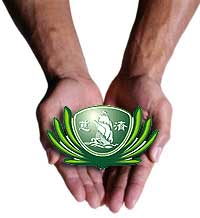
Tzu Chi's anniversary coincides with Mother's Day each year, as its founder Master Cheng Yen set Mother's Day as the common Tzu Chi Day globally during its 30th anniversary. This year the foundation's anniversary came a week after Sakyamuni Buddha's Birthday May 7.
U.N. Secretary-General Kofi Anna sent a congratulatory message to Tzu Chi's Dharma Master Cheng Yen, while 12 cities in six states of the United States proclaimed May 14 as "International Tzu Chi Day."
Tzu Chi's main shrine in Hualien County and the foundation's local chapters throughout Taiwan invited members of the public to join them at more than 60 locations in various forms of celebration, including Buddha-bathing ceremonies and exhibitions.
At Tzu Chi's main shrine, Master Cheng Yen, who established the foundation in 1966, led a long queue of Buddhist followers to worship the Buddha by paying homage to a giant Buddha statue, surrounded by 16 smaller Buddha statues. She also led them to pray for peace and prosperity for the people of Taiwan and elsewhere in the world.
Master Cheng Yen urged people seeking the Dharma not only to be respectful to the Buddha but also to keep a pure heart.
She cited 16 Chinese characters from "The Sutra of Innumerable Meanings" as the motto that all Tzu Chi members have followed in the past 40 years.
The passage, describing the state of mind of "Bodhisattvas" (enlightened Buddhists worthy of nirvana who postpone it to help others) says: "With tranquil minds and constantly in contemplation, they are peaceful, indifferent, non-active, and free from desires. They are immune from any kind of delusion or distraction. Their minds are calm and clear, profound and infinite. They remain in this state for hundreds of thousands of kotis of kalpas."
Tzu Chi Foundation, which began its charitable operations in an impoverished community in eastern Taiwan, has become an international organization with more than 5 million supporters and 30,000 certified volunteer coordinators all over the world. It has a total of over 200 liaison offices around the world. At least 61 countries in five continents, including Europe, America, Asia, Africa and Oceania, have received relief aid from Tzu Chi.
Tzu Chi Foundation started to extend its relief abroad in 1985 through its overseas Chinese supporters.
The foundation was certified by the United Nations as a NGO (non-government organization) on Dec. 22, 2003. -
Foreign monks reincarnate what they've learned in Korea
Not every child in Seoul has the opportunity to attend one of the ubiquitous hagwon cram schools, play soccer or go to taekwondo or piano lessons after school. Kids coming from poor districts and single parent families may find themselves at a loss for something to do after school, unlike their better-off counterparts.
It was with this in mind that American Buddhist monk Myong Haeng Seunim and a group of foreign monks and nuns recently decided to take an active role in the lives of a group of such kids. He is hoping that by volunteering his time teaching English at Wolgoksa Young People's Center (WGSYPC) he could give the kids “a good direction in life.”
The WGS Young People's Center is one of the charities run by the Jogye order of Korean Buddhism. Located in northern Seoul near Mia Samgeori Station, Line No. 4, the center provides an after school venue for kids living in one of the poorest areas of Seoul. Here they can do homework, learn some English and interact with adult supervision. The center can host up to 100 8 to 12 year-olds at a time.
Myong Haeng SN is part of a community of Zen monks and nuns from all over the world called the Gwan eum school of Buddhism. A part of the Jogye Order, the Gwan eum school was initiated by the celebrated Zen Master Seung Sahn SN who traveled across the world during his lifetime attracting many students, some of whom are now monks and nuns living in Korea.
From Malaysia to Poland and many other counties, this school of monks and nuns is unique for its international members who practice Zen Buddhism.
Recently, members of Musangsa (Temple) invited a group of kids from Seoul to the Daecheon Zen Center to partake in such simple activites as playing outside, making paper lanterns with monks and nuns, hearing stories and playing together in the beautiful mountain valley.
While Nun Wan Mi SN from Poland said the kids program is “totally natural,” and “nothing special,” from the beaming faces of the kids as well as adults, it was apparent that it was a special event for everyone there. The kids loved it, and the monks as members of a community that vows to help save all beings every morning seemed to find it totally natural to help society in this way.
Zen master Dae Bong SN spoke with korea.net about the community outreach program. He said, “We appreciate living in Korea. We get so much from the Korean people and culture; emotional warmth. We want to share in community life and give back to the community.”
A few weeks ago, Dae Bong SN, originally from Philadelphia, made a special appearance at the young people's center to tell some stories to the kids along with Myong Haeng SN. Not all the kids at the WGSYPC are Buddhists, and the monks don't try to proselytize or preach, but tell simple stories with basic human messages.
“Service is a really important part of human life,” he said. The Zen master is not looking to indoctrinate kids into Buddhism but enrich their lives and give them opportunities they don't have, noting that they would probably not have a chance to interact with foreigners or learn English otherwise.
Interacting with foreigners from all over the world can be a very positive experience for the kids, he said. There are people from over 10 different countries living at Musangsa. He hopes that the children can develop good relationships with foreigners at an early age, so that when they get older, they will have “a good relationship with the world.”
Humans are like pumpkins which are fighting in a garden, Dae Bong SN told the kids in one story. They keep fighting until a farmer comes out and shows them that their stems connect them all to each other.
Another of his favorite kids' stories is the M&M story: All the different colored M&Ms are fighting until they realize that they are all chocolate inside, so they cannot fight anymore.
Temple Abbot Mu Shim, also an American, said “Society can be very difficult on the kids. They can come here and return to their roots, which are clean and bright. We can give them a taste of what's possible in a place where no one is asking anything of them or pushing them to do or be anything.”
The coordinator of the WGS program notes that this is the only place in Seoul where kids from a “bad background” can go to get a positive influence in their lives. While the center is funded by the Jogye Order, they are still short of money, and the employees often end up giving their time and money to the program for free.
The Jogye Order is also active in sponsoring social outreach programs such as those for the handicapped and homeless and a support center for “comfort women” of the Japanese occupation, among others.
Dae Bong SN said that more and more, religious groups are reaching out in order to help society, not just to further the religion. This is true, he said, among both Buddhist and Christian organizations, and he seems optimistic that religious organizations of all types will work together for the common good of humanity instead of fighting with each other.
Myong Haeng SN hopes to leave a lasting impression with the kids. “Could it be that the answer to happiness and satisfaction in our lives is not really material wealth, but spiritual direction? Even if the kids do not have this kind of question now, perhaps later in their lives they will remember this experience, and it will give them some kind of inspiration or direction.”
Wan Song SN from Singapore had a more simple idea of what she wanted to give kids when they visited her temple. What will they bring back with them? “Happiness,” she said with a smile.
The WGS Young People's Center needs foreign volunteers to teach English classes. For more information, contact An Seon-ae at (016) 9699-9445 -
Ph. D. course on Buddhism soon
The Rising Nepal, May 5, 2006
KATHMANDU, Nepal -- The Lumbini Bauddha University (LBU) is set to run Ph.D. course in Buddhism aiming to address the crunch of teaching manpower on the subject at the higher level.
The newly opened university in Tenhawa VDC of Parsa Chauraha has asked 15 students who applied for the course to submit their research proposals, LBU registrar, Kedar Shakya said.
He said that students from Thailand, Japan, Sri-Lanka, Germany, America and Russia have also contacted for seeking enrollment in the three year Ph.D. course.
The students of Buddhism applying for a Ph.D. need not do Masters in Philosophy (M Phil) as a prerequisite.
The university is yet to start courses in Buddhist studies at the intermediate and Bachelor levels. The development of curriculum for the courses is nearing completion and the courses will be introduced within this year, Shakya said.
He said that the courses of Bachelor and Master level would also be of three years duration but Academic Council of the University is yet to take a decision.
Besides the MA and BA level courses in Buddhist religion, LBU will run five other faculties ? Mahayani Buddhism, Therabada Buddhism, Bajrayan Buddhism, Language/ Script department and History of Bauddha religion, ancient art and cultural department.
Those earning degrees in Buddhist studies would be eligible to serve in the bureaucratic services. For this, the university has been holding necessary consultation with the Public Service Commission.
He said that the demand of manpower specialising in Buddhist religion from the foreign educational institutions was very high.
The first World Buddhist Convention held in Lumbini had endorsed the proposal of instituting a Bauddha University. -
Jet Li almost quit for Buddhism
Contactmusic.com, May 16, 2005
New York, USA -- Martial arts superstar JET LI almost quit acting to become a Buddhist monk - but he was advised to stick to his movie career by his religious guru. The Chinese movie star still meditates daily and follows Buddhist teachings whenever he can.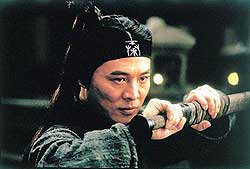
The ROMEO MUST DIE star says, "I wanted to retire in 1997, but I met a Thai Buddhism master who told me to continue to do it, to take some responsibility.
"I have spent more time learning Buddhism than English. I just discovered a lot of personal stuff.
"I meditate every day, wherever I go - in an airplane, just taking the car, in traffic. The longest meditation I took is 10 days, near New York City in the temple.
"It was 10 days, every morning at four o'clock to 10 o'clock at night. I was silent for 10 days, sleeping on the floor with 100 people." -
Tzu Chi to ship 500 tons of rice to Earthquake disaster area
ReliefWeb (Source: Taiwan Buddhist Tzu Chi Foundation), May 28, 2006
Jogjakarta, Indonesia -- Taiwan Buddhist Compassion Relief Tzu Chi Foundation (Tzu Chi) is to send first 100 tons of the 500 tons of rice aids to the Indonesian Earthquake disaster area on 29 May. Currently, the Tzu Chi relief and medical teams are providing medical assistances at various Bantul locations as well as assessing the conditions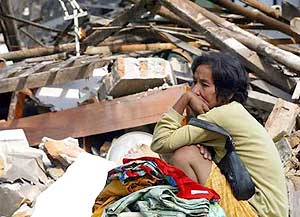
City of ruins: a woman looks at the rubble where her house in Jogyakarta once stood. The earthquake hit just before 6am Indonesian time.
Photo: Reuters
After arriving at Yogyakarta at noon 28 May, the relief and medical team have met with the head of the Bantul County to discuss possible aid programs. The team consists of volunteers and medical specialists as shown in Table 1.
To relief the needs of the disaster areas, Tzu Chi have shipped relief goods via air and land on 27 and 28 May, as shown in Table 1. In addition, 17 tons of rice has been provided to the central kitchen. The first of the five 100 tons rice batches is departing on 29 May for the disaster area.
Additional 60 local Tzu Chi volunteers are schedule to join in the relief and medical team on 29 May.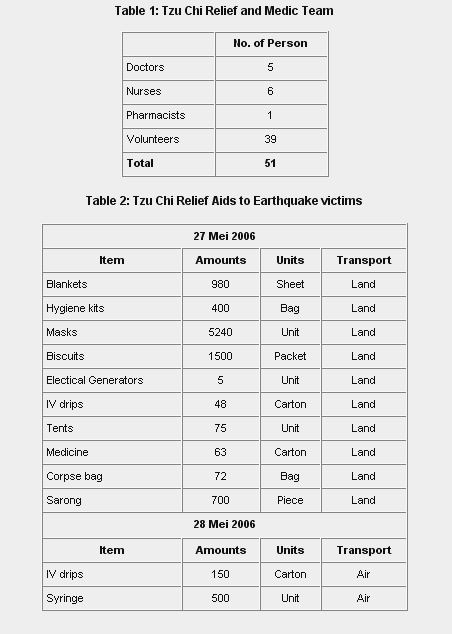
The Bantul local authorities have requested Tzu Chi to provide medical assistances at RS Baru TNI hospital and six locations: Gandong, Gumuh, Batur Patalan, Dukuh Sukun, Srihardono, Kiringan and Sekolah Dasar.
Many residents have left Bantul disaster area, leaving those unable to leave for various reasons remaining. With the continuous rain, the muddy grounds have hindered relief works including rescuing those still buried as well as the construction of tents.
Tzu Chi hopes by providing rapid relief aids to the disaster area, the residents can recover from the devastating disaster as soon as possible.
For further information, please contact:
Ming-Shan Chou (Mr.), +886-3-826 6779 ext.343
International Charity Affairs Office
Taiwan Buddhist Compassion Relief Tzu Chi Foundation
Email: [email protected]
Pompi Junes (Mr.), +62-21-6016332
Yayasan Budha Tzu-Chi Indonesia
Email: [email protected]